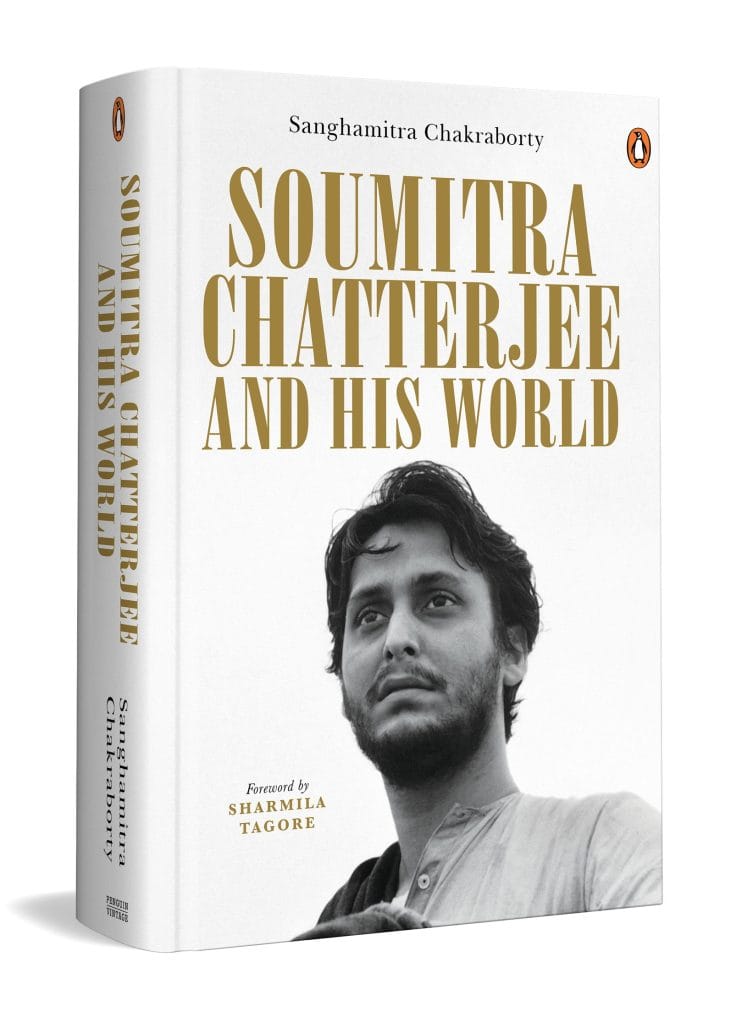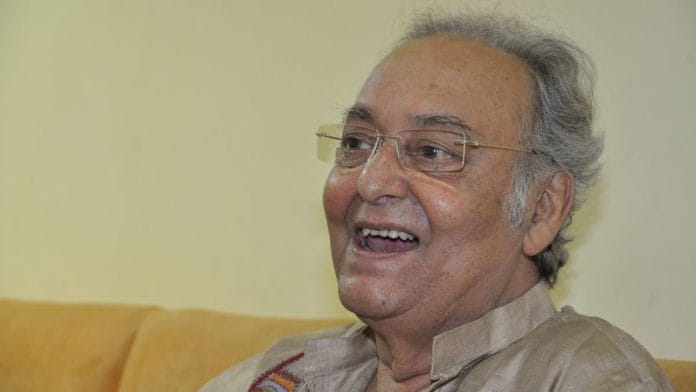The best of us can get weighed down by adult life, but fortunately Soumitra’s smile, or his sudden unrestrained laughter, never faded. The hero of my first film was erudite, witty, a great raconteur and a gentleman — and it made me genuinely happy that he and my husband had struck up a wonderful friendship. Often, when Tiger was in Kolkata, they got together over drinks and adda. My husband always looked forward to meeting Soumitra, and I too considered him the best adda companion and would return from our catch-ups heartily entertained—and enriched.
It’s been over four years since Soumitra left us. The loss I feel is hard to explain—earlier I knew I could pick up the phone and speak to him, he would always be there at the end of the line with an ‘Eije, bolo’. I miss him at times when I need to consult him for something as trivial as how to perfect a recitation. Quite recently, when I was asked to recite from Tagore for an event, I played Soumitra’s recitations to pick up the inflections, which was a blessing. He remains a master when it comes to his acting or recitation even for the new generation of performers.
I had started my career as a precocious teenager and in the past sixty years I have worked with a number of male actors. Soumitra stood out for me with his wit, wisdom and sensitivity. He was so well-read, yet he would never talk down or bore anyone with lectures, he was always engaging and entertaining.
I fondly recall our time on the outdoor shooting of Aranyer Din Ratri and its sequel, Abar Aranye. During Aranyer Din Ratri, Soumitra was staying in Manikda’s bungalow, but our young friend would slip away and all of us would get together for a nightly adda. We had a fabulous time! On the Abar Aranye shoot we were assigned a forest bungalow that Soumitra, Shubhendu Chatterjee and I shared. Location shoots can get dull, particularly in the evenings, but I have the most wonderful memories on both occasions.
I would wake up to the sound of the forest and enjoy some quiet time on my own, and by then Soumitra would be back from his walk and start his voice training on the sprawling balcony of the colonial forest bungalow. And then, after work, we would sit down for our adda, chatting endlessly — all three of us had our own little catch-up every evening that was enormously entertaining. Our laughter may have startled a few wild animals too. The topics changed, of course, during Abar Aranye, when the same characters returned to the forest after years. We were much older, but the charm of those evenings remained intact.
Talking about charm, there’s always been a ‘contest’ between Uttam Kumar and Soumitra Chatterjee. Since I have worked with both actors, I am often asked my opinion. Comparisons, I feel, are unnecessary as they were very different as people and performers. Uttam Kumar had enormous star power; the screaming public would mob him, and I believe he had to be rescued on a few occasions. His women fans were obsessed with him — they would sleep with his photograph under their pillow. Maybe they hoped he would arrive in
their dreams, who knows? Until the end, Uttam Babu courted this frenzied attention. Soumitra had cultivated an entirely different image — he walked the streets, was sighted outside his house or driving around in the city. He was the most unconventional movie star I have come across. Both actors were hugely talented — we were in awe of Uttam Babu but loved Soumitra. Uttam Kumar had a flamboyant lifestyle, but Soumitra was low-key — he was a massive addabaj (a fine exponent of the adda), but was also a poet, editor, wrote plays and later created art. Of course, he too had devoted fans, and the respect he won over the years was quite remarkable.
Soumitra may have had a dim opinion of Bollywood — he never mentioned anything to me. He was a man of great empathy, and he knew it could hurt me. But I have learnt from this book that Soumitra had several offers from leading directors in Mumbai. I feel he should have allowed himself to test the waters a little more before turning his back on Hindi cinema. It’s a real pity that he refused Shyam Benegal — if I had known this, I would have nudged him to reconsider his decision.
My regret is that people outside Bengal have been deprived of his oeuvre and talent. When I came into Hindi films, I was very young, went with the flow and did not take myself too seriously. When I saw the rushes of my first film I cringed and wanted to leave, but I am glad I did not. Soumitra had his reasons to avoid Bombay, of course, but Indian audiences are the poorer for it.
The legacy of Soumitra is enduring — both at home and globally. I consider myself blessed that I knew him and called him a friend. I am glad you are holding a copy of this book. I believe you will get to know him, and his world, a little better. You will be enriched knowing Soumitra Chatterjee just as I have been.
Soumitra’s personal life has been turbulent for years, but he took refuge in his work, stood tall and what he has left behind is a gift that keeps giving. I recently watched our film Barnali, made in the early ’60s, and ended up with a lump in my throat. Witnessing Soumitra’s last journey online, where all of Calcutta had gathered to say goodbye, was also a deeply emotional moment for me.
He was and will be my Apu — always.
 This excerpt is from Sharmila Tagore’s foreword from Soumitra Chatterjee and His World by Sanghamitra Chakraborty. It has been published with permission from Penguin Random House India.
This excerpt is from Sharmila Tagore’s foreword from Soumitra Chatterjee and His World by Sanghamitra Chakraborty. It has been published with permission from Penguin Random House India.







Indians, outside Bengal, were not “deprived” of S Chatterjee. Rather, they were “lucky” to have been spared and saved from the scourge of communism
Intellectuals like Mr. Chatterjee, who stoutly supported the Left and it’s anti-industry policies in West Bengal, are the reason why Bengal has been on a decline for the last five decades. Instead of speaking truth to power, they became cheerleaders of the Left Front as it dragged Bengal through the mud.
These intellectuals must be held just as responsible for the sorry state of affairs in today’s Bengal. What was once the most developed and industrialised state in the nation has now been reduced to a laggard- a pale shadow of it’s former self.